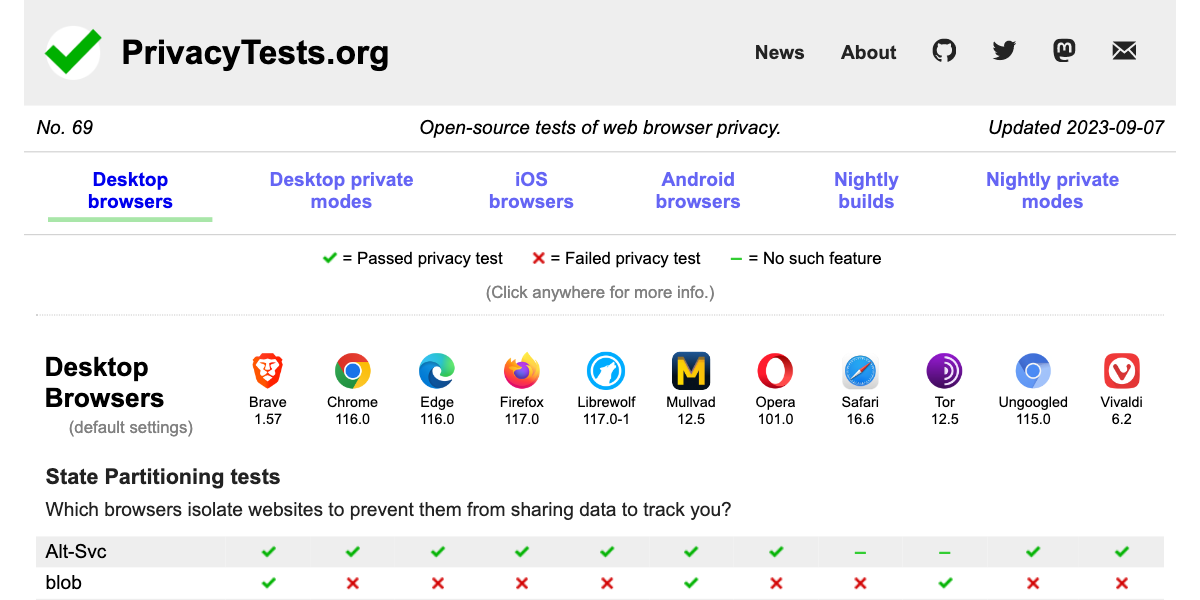- cross-posted to:
- privacy@lemmy.ml
- privacy@lemmy.ml
- cross-posted to:
- privacy@lemmy.ml
- privacy@lemmy.ml
https://privacytests.org rate Brave as the best browser.
What hasn’t been said as explicitly yet: It being Chromium-based means there’s tons of implementation details that are bad, which will not be listed in any such comparison table.
For example, the Battery Status web standard was being abused, so Mozilla removed their implementation: https://www.bleepingcomputer.com/news/software/battery-status-api-being-removed-from-firefox-due-to-privacy-concerns/
Chromium-based browsers continue to be standards-compliant in this regard.And this is still quite a high-level decision. As a software engineer, I can attest that we make tiny design decisions every single day. I’d much rather have those design decisions made under the helm of a non-profit, with privacy as one of their explicit goals, than under an ad corporation.
And Brave shipping that ad corp implementation with just a few superficial patches + privacy-extensions is what us experts call: Lipstick on a pig.
God this is the answer I wanted. I could never put it all into words like you did. This answer, I’m stealing it.
Looking into privacytests.org, the main developer behind it is someone who contributes to Brave source code. He may not be officially affiliated with the company, but it would be hard to ignore any sort of bias towards Brave.
I’ve been seeing a lot of techy “privacy” blog posts, even here on Lemmy. It’s a little annoying when they muddy up the waters like this. People new to privacy will come across them and head off in the wrong direction.
We need more comments calling them out and linking to proper resources. The site linked in this post even has a confusingly similar name to the actual recommended resource:
https://www.privacyguides.org/en/desktop-browsers/
(And a quick sidenote: privacyguides is the same team from privacytools. There was a name change after the original owner for the domain came back and fought over the project. PrivacyTools is now a paid advertising site, and it is NOT recommended. https://www.privacyguides.org/en/about/privacytools/ )
Edit: while I’m at it, here’s the official community on Lemmy
Even Privacy Guides has its own set of controversy, where basically one group completely took over the community from its founder (who themselves wasn’t squeaky clean, either).
Isn’t that the same controversy, just worded in favor of privacytools?
I’m trying to judge based on what I’ve read from each party, and I’m still leaning towards the privacyguides account of what went down
The recommendations are probably the biggest factor for me. See the VPN pages on each site
Tbh I don’t really care enough either way. But I would lean a little more towards privacyguide’s account of things, while I still don’t fully trust their judgement either. I can’t remember why now but there was something they were very fanboy-like over which I disagreed with, and since then I haven’t been following their advice, let alone their drama.
I found this on my privacy journey. Don’t know how relevant it is today though
The article on privacyguides I linked above touches on some of this as well. I haven’t read through this one, but seems like the less verifiable one in a “x said y said” situation?
Less “took over” more the founder left and the community picked up the pieces.
Please use universal links
thanks, fixed!
deleted by creator
PrivacyTests actually started prior to him joining Brave. Brave contacted him, and used that resource as a kind of checklist, to try and improve their browser. Despite the guy now working there, it remains an independent project.
The project technically being independent does not mean it isn’t biased towards one browser.
It’s still unfinished, but he’s working on a tool for you to test your own browser. You can do so here:
https://privacytests.org/me.html
It’s the exact same tests he runs, that are open source. Everything can be found, (if you don’t trust the guy) on his GitHub:
https://github.com/privacytests/privacytests.org/tree/master/scripts
You can have open source software with a bias towards something.
You can but:
- There is no clear indication of bias, from PrivacyTests, just accusations.
- If the tools and tests ARE open source (which they are), they can be checked for bias/cheating. Someone could also expand (fork) upon them to give more of a rounded opinion.
A better defense against accusations of bias is a group or persons transparency.
Simply having an open source methodology and code base isn’t transparency either, since it takes a much, much deeper and more developed skill set to audit both software source code and testing methodology than it takes to raise an eyebrow at sus circumstances.
Okay? Where is the proof it’s biased towards one browser
brave owns that domain, I believe. Of course they are going to rate their browser te best
Not exactly, the guy who runs it became a brave employee shortly after starting it. but they claim to continue to run it independently.
They were not rated that well in the beginning. Brave contacted the guy who runs the website and asked about the tests he was running, then patched their browser accordingly until it passed all the tests it does today.
just the non private mode protection from brave vs librewolf…
The product isn’t all that bad, but the company behind it have proven they’re not trustworthy many times over.
Their search engine is great… Never used the browser though.
I’ve been trying out the engine for a few weeks now. At first I was impressed, and Goggles are a neat feature. But somehow the more I use it the more I realise how much I am going back to Bing or Google because Brave couldn’t show me even one useful result for a niche error or question. Maybe I’m doing something wrong but even using Reddit or forum Goggles sometimes it will show me only shitty article sites, more than Google does.
I don’t run Brave because Brave runs a crypto scam right in the browser.
I don’t care that you can disable it, I don’t care that it might be the only way they found to make a buck out of free software: anyone who dabbles in crypto is instantly sketchy. And I don’t want to run a piece of software as critical as a browser made by someone who’s not 100% trustworthy.
I don’t care that you can disable it
It’s opt-in.
Mullvad and Signal support crypto
Mullvad accepts crypto as payment; there aren’t many other options for anonymous online payment methods today. What Mullvad aren’t doing us creating and running their own cryptocoin in support of their advertising wing. The two are not equivalent.
Well then maybe don’t call anyone who “dabbles in crypto” sketchy
I didn’t; that was someone else. But you did make the false equivalency.
I’m not anti-crypto myself, incidentally…
And of course, my mistake. Didn’t mean to falsely accuse you.
No problem. All social media apps on mobile have this issue of obscuring the chain. It’s the nature of the beast.
How did I make a false equivalency when the op literally called any project that “dabbles in crypto” a possible scam? That includes Signal as well as Mullvad. Op’s comment does not in any way indicate the use of one’s own currency, simply abolishing all services using crypto.
Don’t you recognise a difference between creating a cryptocurrency to use it to encourage people to watch ads, and allowing people to pay with for a service with an existing cryptocurrency in the cause of anonymity? There’s a fundamental difference, right? If not, then fair enough - them taking exception to Brave but supporting Mullvad is hypocracy in your eyes.
FWIW, I believe no defender of !privacy should be opposed to cryptocurrencies; for better or worse, they’re the only option for online anonymous payments. But I also object to the proliferation of bespoke shitcoins, most of which are truly pyramid schemes in intention amd execution. But it’s a fine line, I’ll admit.
Of course I recognize the idfference. And I hate brave for somewhat abusing their users like they do. Still, that is not what op said. I won’t repeat it again, but that fundamental difference you are speaking of was not highlighted by them. Possibly leading other people to believe that cryptocurrency is bad to use as a whole, which as yourself has said is not right if one repsects privacy.
test post
What makes it a “crypto scam” and what makes “dabbling” in crypto inherently “sketchy”?
Come on mate, there’s no way you’d be aware of crypto in an online space like this without being well aware of why most people consider it a scam.
On the contrary, I’d expect people in these spaces to be more capable of separating the signal from the noise with crypto and not default to “crypto bad”.
Crypto is bad though. If you can’t see it, you’re either one of the scammed or one of the scammers (in which case you can see it but pretend you don’t).
Money is bad—it is used for a lot of bad things like trading drugs or hiring killers…? Money is the root cause of mugging, scams, exploitation, killing, corruption…?
Money is good—it can be used to help people…?
Perhaps money is not good nor bad; a person who uses it may be ethical or unethical. Please do not confuse pure mathematics or technology (such as public key cryptography) with its users/abusers.
Bingo. The myopia in this community is honestly kind of alarming.
You sound delusional
Such a juvenile take.
Honestly I agree, quite sad to see such hostility to a relatively harmless technology, although Brave’s implementation is a bit meh. I like the idea as a concept, to have websites and content creators to have a source of income without compromising privacy, but using BAT as the median currency kinda sucks. I’d have much rather Brave have chosen a more mainline currency. Thankfully by default, it isn’t even used, only icons/new-tab-page are there to activate/use it… having it be an opt-out solution would have soured me more. Default is essentially advertising its use, the ‘disabling’ is just hiding the references, which I do ofc.
That said, I don’t care enough about this to take action. I still use it as my secondary for Firefox. I do actually use the brave search though, even on Firefox, as it seems to be better than DDG these days. Also not based/reliant on Bing.
I wouldn’t really call it a crypto scam if they aren’t demanding or asking you buy it, just giving you free crypto
just giving you free crypto
If being alive for 40-some years has taught my anything, it’s that companies “Just giving you free anything” should raise red flags.
Even if it is benevolently intended, I’d be suspicious and very cautious about using their products.
They give it in return for showing ads
Point still stands.
Everyone has to figure out what they will/will not tolerate for themselves in the internet ecosystem.
I’m mostly just advocating caution.
deleted by creator
Well, I’m fairly certain calling people ‘morons’ and ‘fucking stupid’ isn’t changing anyones minds either.
Quite the contrary. Antagonizing tends to turn people against you.
deleted by creator
That website is run by an employee of Brave, who rates the privacy of browsers based on their default settings (which Brave tends to perform best in). If browsers prompt the user to select their privacy settings on a first run, he scores them based as if the user had selected the worst privacy options.
If he actually spent a few minutes setting up each browser, as is always recommended within the privacy community, that table will look a lot different. But then Brave wouldn’t stand out as much…
almost nobody does that though. And after a certain amount of time even power users are like “yeah. f* it”. So default settings ARE important imo
They are, but when you explicitly have to go through the options you probably won’t select the weaker ones.
He’s launching a self-test tool, for anyone to use. It’s still unfinished (last time I checked), but tweaking some values doesn’t make a huge amount of difference. Where it does, he included a Browsers similar to those settings, pre applied (eg: Librewolf, Mullvad Browser). Plus by that logic you should also test Brave on Aggressive mode, which by default, is set to Standard.
That website is run by an employee of Brave
Like, for real? That’s kinda funny.
For further explanation of any point, please hit me up :)
- It is Chromium based
- It has used dubious methods in the past (replacing links with affiliate links, the whole ad/crypto thing, …)
- Brave’s business model relies on ads (I think)
- [This is a weak point, but at least in the privacy community, Brave isn’t super popular. It feels more geared towards the “hyped crypto early adopters”. [1] It might be “fine” for someone switching from Chrome (which is always a good thing) but going all the way would be a modded Firefox.]
TL;DR For most provacy concious Brave users, Brave is a step in their journey towards more privacy, and not the final destination.
[1] The “dumb AF tech youtubers” you mentioned in another post are typically the Brave hype crowd. This is not meant to discredit Brave; it’s just that a share of their users are this way.
All good points but I’d like to point out that the first one is likely the biggest reason not to use it - it’s based on Chromium and continues to give Google/Chrome the browser market share to dictate the direction of the web.
I’ve been using Firefox for years, and recently switched over to Brave because it was able to provide a unique fingerprint result on EFF’s fingerprint tool. Even if I used the same plugins, Firefox had a unique fingerprint.
I ignore all the silly crypto and ad bs. Why should I use FF over Brave
@Ado @Linus_Torvalds The main reason I prefer FF is diversity of engine. Brave is based on Chromium, as are basically all other browsers but Safari. FF still uses their own rendering engine, and provides superb privacy as well. Given that @leo is also a proponent, I feel comfortable with #firefox.
If I were to switch browsers, though, it would be to #bravebrowser.
FIngerprinting is not super easy. E.g. you might have a ‘unique’ fingerprint with FF but if it changes every time, than I would consider it actually a privacy feature. Did you have the same addons installed on BRave and FF while testing (as Addons play a part in Fingerprinting)? And finally: A lot of fingerprinting techniques can be blocked before they even start (no JS, …). I feel like your opinion is rather one-sided.
As to why FF> Brave: Basically the Chromium argument. Diverse engines are better for the health of the web.
My comment says I had the same plugins.
My comment says I used Firefox for years and now am trying brave. It cannot be less one sided.
Are you suggesting my Firefox fingerprint changes every time? Where is the info on that?
So much with anything privacy comes down to trust. Any piece of software’s technical ability to keep you private is of course important but when it comes to a very large (in terms of code and use) piece of software, being able to trust the motivations and intent of the people behind it is also very important.
It’s now reached the point that I personally don’t feel I can trust the person leading the company, or the intent behind the software(s) the company makes.
Brendan Eich is a homophobe and an antivaxxer. It’s hard to trust in the common sense of a man who thinks in these ways.
Brave has been caught inserting affiliate links and ads that track and just recently of selling other people’s data. Any one of these things, taken in isolation is bad enough but this is now a pretty much established pattern of very questionable behaviour.
I also forsee a time when the browser is going to have to make some concessions to it’s Chromium base. I know they’ve said the change from Manifest v2 to 3 won’t affect ad blocking as their Shield won’t be an extension but built in and that they’ll also carry on supporting v2 but the issue goes beyond merely adblocking and they’ve been unclear on exactly how and for how long they’ll support v2. As long as they’re Chromium based browser, they are dependent on Chromium and the whims of Google developers. It’s hard to see a good future for Brave.
The man who is CEO is a shitter who gave us the blessing/curse that is JavaScript
They’re relying on a cryptocurrency for growth
They use Chromium/Blink
Its the same guy who made firefox though?
He is
Chromium, Crypto, Trash UI
Brave as a browser is fine for now.
But they’re crypto bros with concerning views and it’s just yet another chromium browser.
We really have an issue with the monoculture of web browsers.
Damn, it really is a monoculture! I knew about this problem for years, but this is the first time, I had someone call it out as ‘monoculture’. This is amazing, I’m stealing it!
Judging by a default browser is also really misleading. Firefox is by far the most private with extensions, no competition.
What extensions would you recommend?
This is just my personal list
- Ublock origin in advanced mode to block js like matrix did (or in basic mode on mobile/if you don’t want to waste time fixing broke websites)
- Decentraleyes to avoid loading libraries
- Cookies autodelete to you guess it
- Consent O Matic to auto consent gdpr banners
- Link cleaner to clean copied urls from tracking queries
- Redirector to redirect famous websites to their alternative front-ends (YouTube to piped etc)
I go pretty hard core while making sure it “just works”. People will mention LibreWolf, but the fingerprint resistance causes too much breakage for me. I install uBlock Origin no matter what, enable every single filter except the language lists. I install Dark Reader and set it to a timed schedule which is comfy for me.
Then I install NoScript then enable “Temporary set top level sites to trusted” and enable media under the trusted tab. This fixed majority of the breakage, but you sometimes need to tweak it. You can just not use NoScript if it’s too much of a hassle, uBlock Origin does basically everything you need anyways.
Also of course if you’re using stock Firefox, make sure to turn off analytics and telemetry in the settings, go to
about:configand setpocket.enabled(or something like that, idr) to false. Then I set my default search to duckduckgo.Awesome, thank you!
You can use ublock in advanced mode and replace noscript I think
I’ve had good experience with LibreWolf, but disabling the resist fingerprinting is QoL compromise with privacy easily accomplished in the settings.
uBlock and the right Firefox settings is good enough in my opinion, you can go really crazy with just those two things but you’ll also break a lot of sites, I found a middle ground that I like.
That’s just browsers with default settings. Firefox doesn’t have a built in ad block, so it will always perform worse in that test. I guess FF + ublock origin + hardened settings (such as arkenfox) would perform like brave, if not better. For example, if you check android browsers, you see that Mull (a hardened fork of Firefox) performs great, even without ublock (that you can install as extension anyway).
Isn’t that enough (default part). The vast majority of people won’t change defaults.
Yes, I think that’s the point. Most browsers can be hardened, easily or not, but only few have actually good defaults.
From the JDLR dept… notice how brave is listed first, and passes every test (except a very few)
This report just looks biased. Even if it is totally legitimate, and many users have pointed out how it isn’t , it looks biased.
It looks like every sales pitch for a product where they list everything their product does and how it’s better than the other things.
I vote librewolf
And under misc. tests, neither Mullvad nor Tor are identified as being Tor enabled? Say what now?
Please forgive me, I’m going to keep asking this everywhere I can until hopefully get an answer.
I love librewolf and I want to use it, but I can’t get it to render the symbols that some websites use to make their UI work. I’ve tried downloading fonts but they’re all mapped to private use area. I think they need to be downloaded on a per website basis but librewolf seems to categorically refuse.
I really want to stop using brave and I honestly don’t want to figure out arkenfox.
Since LibreWolf is libre software, it’s likely that a user has freedom to tweak this maybe via about:config. You just need to ask this directly in the LibreWolf community.
I think I know what you’re talking about, though. Perhaps CSS @font-face is forbidden, because many sites use Google fonts, which allows them to track you.
If Tor Browser is acceptable, give it a try. While TB too has very strict font restrictions to avoid finger-printing (so that a remote site may not know which fonts your system already has), web fonts are allowed by default. It’s relatively harder to distinguish/track individual Tor users, since TB hides your real IP & by default cookies are per session only.
LibreWolf shows your real IP, so it’s understandable and reasonable that it wants to be more careful about fonts. Still a user should be given freedom to do whatever, at their own risk. That’s what free software is all about, after all. Just a thought…
I’m not sure I understand… The symbols?
Could you give an example?
Librewolf has stuff cranked down for a reason putting privacy before usability
I agree it can look biased, until you check the initial of each browser.
What comes out ? They are listed by name.
No it isn’t. It’s just listed in alphabetical order. It’s not bias lol. People will see evil intent where just to confirm their own biases and beliefs.
Just install Librewolf
Why not Firefox?
Librewolf has privacy defaults and a few features that are different.
deleted by creator





















